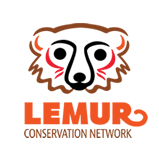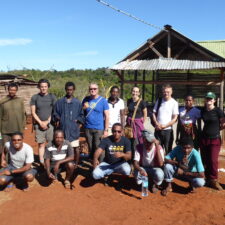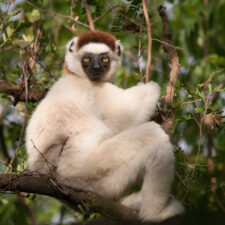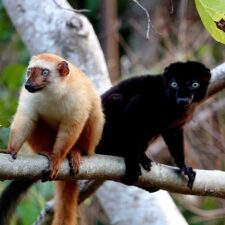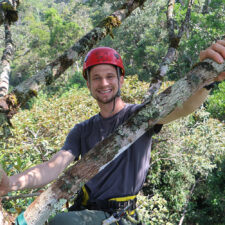Conservation Solutions for Lemurs that Support People
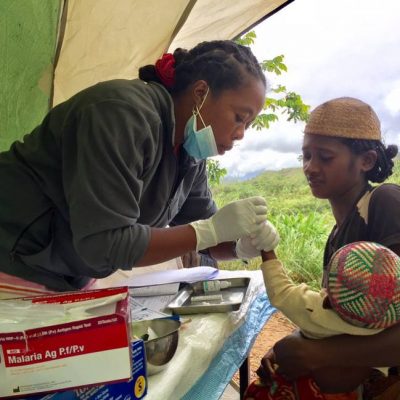
In Madagascar, Malagasy people are the key to saving lemurs from extinction.
While international support and resources are often vital, local buy-in is the key to ensuring that work succeeds in the long term. Building trust, capacity, and solutions in partnership with local communities and Malagasy professionals is the best way to help wildlife. It is imperative to empower local people and build Madagascar’s capacity to implement and maintain successful conservation programs for years to come.
Building Local Capacity in Science and Conservation
Empowering Malagasy scientists and conservationists is key. Madagascar’s scientific community is robust, but it must be supported. Because they understand Malagasy culture first-hand, Malagasy scientists and NGOs can have a bigger impact with local people than their international counterparts do.
Madagascar’s scientists and conservationists must be supported through opportunities for further training, funding, fellowships, jobs, conference attendance, networking, and more. Additionally, international scholars who work with Malagasy peers must give fair credit and pay to their in-country colleagues.
Working with Communities on Solutions
One way to increase the likelihood of local buy-in on conservation projects is to work with communities to identify win-win solutions that address both community needs and the desired conservation outcomes. While it is not always easy, conservation groups must build these relationships over the long term and involve local people in decision making. Organizations that work to maintain long term relationships and deliver what they promise will be much more likely to succeed.
Providing Income through Jobs in Conservation, Tourism, or Sustainable Businesses
One of the best ways to create local support for conservation is to link conservation to livelihood. This is especially true in Madagascar, where the economy is poor and many people struggle. Employing Malagasy people through jobs that support the environment is a win-win. Local people earn income to support themselves and their families, while habitats and wildlife are protected.
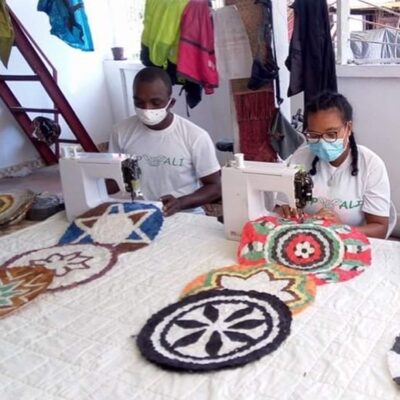
Handmade in the rainforests of Madagascar, CPALI’s Wild Silk products support rural farmers and native species.
Some examples of conservation-based jobs include:
- Working with conservation organizations on reforestation or other projects
- Working on scientific research as a researcher, research assistant, or field guide
- Working for sustainable international businesses with a presence in Madagascar, like Beyond Good Chocolate
- Working in responsible tourism as a tour operator, park guide, driver, or running a hotel or restaurant
- Creating sustainable products like raffia goods, honey, or silk
Organizations with Job Creation Programs
- Conservation through Poverty Alleviation (CPALI): silk
- Eden Reforestation Projects: reforestation
- Madagascar Biodiversity Partnership: reforestation, research
- Wildlife Conservation Society: ecotourism
- Arol Ecolodge: ecotourism
Education to support lemurs and people
Education is vital to conservation success. After all, people can’t care about something they don’t know about! It is important that Malagasy people of all ages have access to quality educational resources in general, as well as quality conservation education resources. Some of the ways conservationists incorporate education into their work include:
Supporting Local Education
- Building and maintaining school buildings
- Funding for scholarships, teacher pay, and supplies
- Running conservation education programs
- Encouraging an interest in science, technology, engineering, and math (STEM) in Malagasy students
- Providing training for Malagasy scientists and professionals
Supporting International Education
- Supporting the scientific research community through opportunities for networking, training, collaboration, and research
- Inspiring and teaching the general public about lemurs, science, and conservation
Organizations that Support Education
Food and Health Support for Malagasy People
Though providing food and health support may not seem like conservation work at first glance, this work directly benefits people by helping them with basic human needs. When human needs are fulfilled, pressure on the forest is lessened. Some of this work is described below.
Medical Care
- Organizing general medical and dental missions in remote regions of Madagascar
- Providing access to birth control and maternal care resources
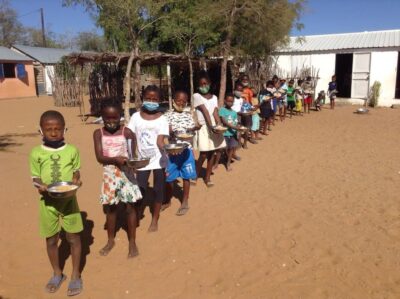
When Madagascar was in COVID-19 lockdown, school was not in session. Primary school children at La-marmaille Mangily were still able to get lunch, thanks to Lemur Love and their supporters.
Food and Agriculture
- Providing food supplies during times of hardship (i.e. COVID-19)
- Building community gardens so that people have access to fresh food where they are rather than going out into the forest to hunt
- Developing alternative protein sources like fisheries, sakondy (insects), and chickens, in collaboration with local communities
- Developing agricultural businesses like beekeeping, which provide both income and a food source
Organizations that Support Food and Health Programs
Ecotourism to support people and wildlife
Ecotourism, when done correctly, benefits both people and wildlife. The main benefits of responsible ecotourism in Madagascar are that it:
- Boosts the economy of the country
- Shows the financial value of protected areas and wildlife
- Provides livelihoods for individuals working in tourism
- Provides financial motivation for communities near reserves to protect habitat and limit poaching
Organizations that Support Ecotourism
- Halt Poverty
- Madagascar Wildlife Conservation
- Association Mitsinjo
- Arol Ecolodge
- Association Tantelygasy
